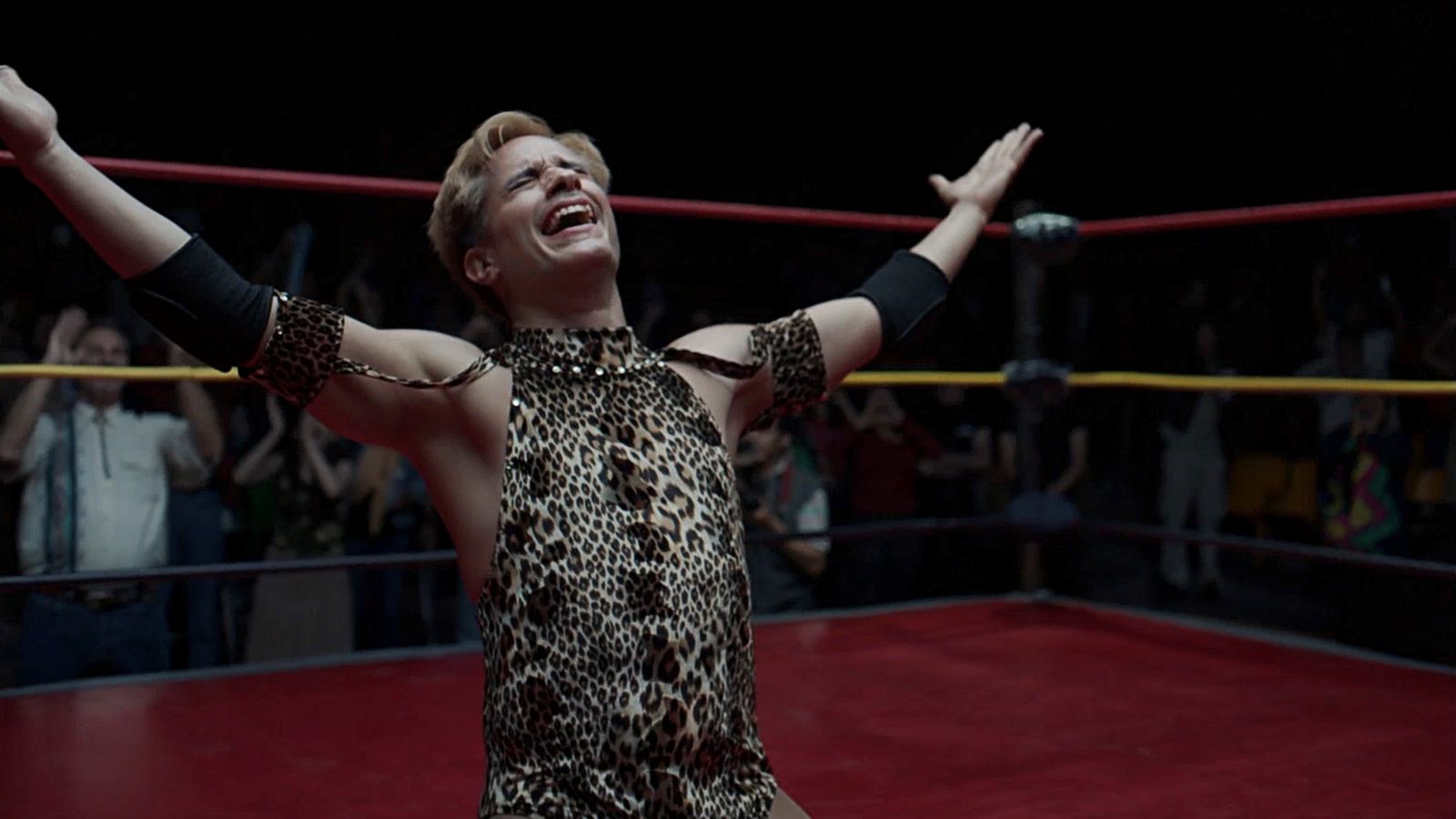True stories of various stripes took centre stage on the second day of online screening at Sundance 2023. We took in a biopic of a legendary gay wrestling icon, a sensitive memoir of a girl growing up with a gay single father, and the harrowing images filmed by an intrepid team of journalists in the besieged Ukrainian city of Mariupol.
Cassandro (Roger Ross Williams/ USA/ 2022/ 99 mins) features what could be a career-best performance from Gael García Bernal as Saúl Armendáriz, who became a legend in Mexican Lucha Libre wrestling as the groundbreaking titular character. Prior to Cassandro, exótico wrestlers (male luchadors performing in drag) were invariably cast as villains in the scripted bouts, so if was pretty much guaranteed they would lose, to the howls of a homophobic crowd. Roger Ross Williams’ pacey biopic follows Armendáriz from his early career to one of the most popular wrestlers on the circuit, smashing the boundaries what of could be achieved as an openly gay athlete. Having directed an earlier documentary short on his subject, Wiliams has a clear affinity for the story, even if a fair few of the details are skipped over or a little sanitised.
Bernal’s achievement is considerable, sensitively portraying Armendáriz and the heightened persona of Cassandro, while also demonstrating some considerable technique in the ring. Matias Penachino‘s camera gets up close and personal during the matches themselves, capturing the sweat and athleticism to great effect. Cassandro works just as well offstage, as Saúl mirrors the mistakes of his beloved mother Yocasta (Perla de la Rosa) by falling for a married man (Raúl Castillo). The beats are those of a standard biopic, but Bernal’s magnetic charisma does a lot of heavy lifting, and there’s something compelling about the gritty, grungy world of Mexican wrestling that is inherently easy to cheer for. 3/5
Fairyland (Andrew Durham/ USA/ 2022/ 114 mins) is a more conventional LGBT story, but a very fine one. It’s also another true-life story, adapted from a memoir by Alysia Abbott, about a girl growing up with an openly gay single father in ’70s and ’80s San Francisco. Scott McNairy is excellent as Steve Abbott, a rather feckless bohemian who finds himself stumbling along as a parent after the death of his ex-wife. Nessa Dougherty plays Alysia as an impish, inquisitive little girl in the ’70s, and CODA‘s Emilia Jones takes over as the story takes a much darker turn in the ’80s. As with Cassandro, it’s told in a familiar, but it doesn’t matter when its told with such warmth and sensitivity.
This film of two distinct halves is matched in its aesthetic style. Greta Zozula‘s lovely photography is lushly textured and impressionist 16mm in the optimistic ’70s, indulging both young Alysia’s childish wonder and Steve’s fantasy of the carefree, hedonistic life of a poet. In the ’80s, the images become sharper and the colour palette far more muted. For as with any drama that spans the 1910s or the 1930s will inevitable smash brutally into the immovable object of war, so the spectre of AIDS comes to haunt the story. Even in the sunniest moments there’s always a sense of doom. It’s easy to forget now the confusion and ignorance of the disease, and this initial period is well captured by director Andrew Durham. Alysia is baffled by the proliferation of young, male faces in the obituary columns, and doesn’t understand that when a young man Steve knows enters a hospice, he isn’t coming out. It would be easy for the film to slump into melancholy, but a fine balance is struck, exemplified by a wonderfully-played scene between McNairy and Jones that resolve a lifetime of resentment, hurt, and things unspoken. A modern take on an old-fashioned weepie, it’s a story of deep humanity told very, very well. 4/5
Yet another true story, and one that should never have to be told is Mstyslav Chernov’s 20 Days in Mariupol. (Ukraine/ 2022/ 94 mins). This heart-racing, heartbreaking documentary follows a team of Ukranian journalists as they enter the strategically vital city of Mariupol just as Russia begins its ‘special operation’ in the country. As the days tick by and the stakes and the horrors increase drastically they find themselves trapped in the city, holed up in a hospital surrounded by Russian forces, and with the knowledge that they have to escape the stricken city to get the harrowing footage they’ve accumulated to the world’s attention. Featuring unspeakable images of bloodshed and trauma, it’s a film with such an inherent value that to review it is fairly redundant.
Instead, it’s easier to simply pay tribute to the medical staff who bravely and stoically carried on in impossible conditions as more mangled bodies are brought in and the relentless shelling continues. Like the similarly astonishing For Sama, 20 Days in Mariupol thrusts the viewer beyond the headlines into the terrifying immediacy of a city bring ripped apart in real time. As things descend further into hell, Chernov’s monotone voiceover of the events begins to sound truly haunted and riddled with survivor’s guilt. Even though it was vital that they got out, and that we know the extent of the situation is down to their escape, Chernovs’ regret at those being left behind is palpable. Perhaps the most terrifying thing is that we only see the first 20 days. The city didn’t fall until the 86th. Given the hollowed shell Chernov and his crew flee, the devastation by then is almost unimaginable. 5/5


Comments